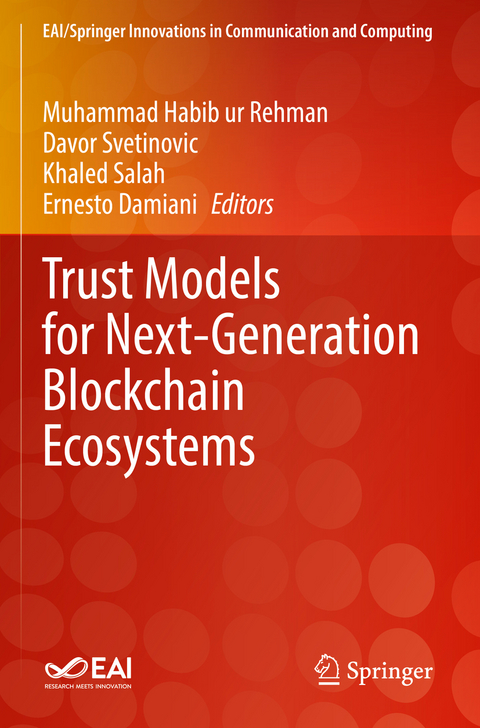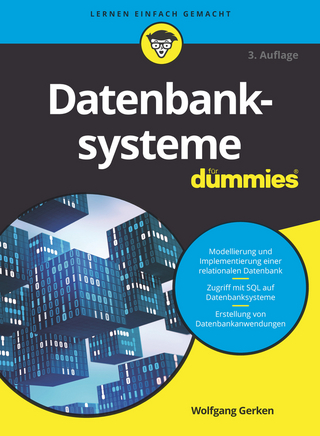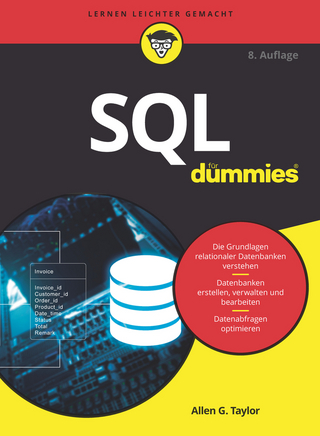
Trust Models for Next-Generation Blockchain Ecosystems
Springer International Publishing (Verlag)
978-3-030-75109-8 (ISBN)
This book discusses the trust models for next-generation Blockchain ecosystems. The book provides a comprehensive discussion on various trust factors involving security, anonymization, reputation, governance, economic models, and other relevant determinants. The book covers various topics in breadth and depth. In addition, it sets the foundation to involve the readers in understanding the core theories supplemented with technical and experimental discussion. The book starts by laying out the foundations of trust models in Blockchain ecosystems. The authors then provide a study of existing trust models Blockchain networks. They then provide identification of trust factors and discuss each trust factor. The book concludes with a future outlook of trust-enabling Blockchain ecosystems.
- Outlines the trust models for next-generation Blockchain ecosystems;
- Covers the trust issues in various Blockchain ecosystems running in public, private, consortium, and cloud environments;
- Features issues such has privacy, security, scalability, and requirements in Blockchain.
Muhammad Habib ur Rehman is currently working at center for cyber-physical systems of Khalifa University in United Arab Emirates as a postdoctoral research fellow. He is currently working on trustworthy Blockchain technologies for intelligent cyber-physical systems. His main research activities include research and development of trust models for decentralized and trustworthy artificial intelligence applications for cyber-physical systems. He is also an alumnae of DAAD's postdoctoral network since September 2019. Habib is a bright spark fellow and he obtained his PhD degree from faculty of computer Science and information technology, University of Malaya, Malaysia. He completed his bachelors and masters degrees in Pakistan whereby he received gold medals and 100% fee-waiver scholarships from COMSATS University Islamabad, Pakistan. Overall, he has authored/co-authored 40 international publications including journal articles, conference proceedings, book chapters, and magazine articles whereby his 04 articles are categorized as highly cited publications by Web-of-Science. Dr. Habib's research interests include blockchain technologies, cyber-Physical Systems, secure key management, big data, edge computing, and industrial IoT. Dr. Habib is a professional member of IEEE.
Davor Svetinovic received the Ph.D. degree in computer science from the University of Waterloo, Canada, 2006. He is currently an Associate Professor of computer science with the Khalifa University of Science and Technology, UAE, and a Research Affiliate with the Media Lab, Massachusetts Institute of Technology (MIT), USA. Previously, he worked as a Visiting Professor at the Massachusetts Institute of Technology (MIT) and a Postdoctoral Researcher at the Lero-the Irish Software Engineering Center, Ireland, and the Vienna University of Technology, Austria. He leads the Strategic Requirements and Systems Security Group (SRSSG), and he has extensive experience working on complex multidisciplinary research projects. He has published over 80 articles in leading journals and conferences. His current research interests include systems security and privacy, blockchain engineering, and artificial intelligence. He is a Senior Member of IEEE and ACM. Khaled Salah received the B.S. degree in computer engineering with a minor in computer science from Iowa State University, USA, in 1990, the M.S. degree in computer systems engineering and the Ph.D. degree in computer science from the Illinois Institute of Technology, USA, in 1994 and 2000, respectively. He is currently a Full Professor with the Department of Electrical and Computer Engineering, Khalifa University, UAE. He joined Khalifa University, in August 2010, where he is teaching graduate and undergraduate courses in the areas of cloud computing, computer and network security, computer networks, operating systems, and performance modeling and analysis. Prior to joining Khalifa University, he worked at the Department of Information and Computer Science, King Fahd University of Petroleum and Minerals (KFUPM), Saudi Arabia, for ten years. He has over 190 publications and holds three patents, has been giving a number of international keynote speeches, invited talks, tutorials, and research seminars on the subjects of blockchain, the IoT, fog and cloud computing, and cybersecurity. He is a member of the IEEE Blockchain Education Committee. He was a recipient of the Khalifa University Outstanding Research Award, in 2014 and 2015, the KFUPM University Excellence in Research Award, in 2008 and 2009, and the KFUPM Best Research Project Award, in 2009 and 2010, and the departmental awards for Distinguished Research and Teaching in prior years. He serves on the editorial boards of many WoS-listed journals, including IET Communications, IET Networks, Elsevier's JNCA, Wiley's SCN, Wiley's IJNM, J.UCS, and AJSE. He is the Track Chair of the IEEE Globecom 2018 on Cloud Computing. He is an Associate Editor of the IEEE Blockchain Newslet
Introduction.- Foundations of Trust Models in Blockchain Ecosystems.- Study of existing trust models Blockchain networks.- Identification of trust factors and chapter-wise discussion on each trust factor.- Future outlook of trust-enabling Blockchain ecosystems.- Conclusion.
| Erscheinungsdatum | 25.10.2022 |
|---|---|
| Reihe/Serie | EAI/Springer Innovations in Communication and Computing |
| Zusatzinfo | XVI, 278 p. 90 illus., 62 illus. in color. |
| Verlagsort | Cham |
| Sprache | englisch |
| Maße | 155 x 235 mm |
| Gewicht | 505 g |
| Themenwelt | Mathematik / Informatik ► Informatik ► Datenbanken |
| Schlagworte | Blockchain • block time • consensus mechanisms • Governance • Scalability • tokenomics • trust, security |
| ISBN-10 | 3-030-75109-0 / 3030751090 |
| ISBN-13 | 978-3-030-75109-8 / 9783030751098 |
| Zustand | Neuware |
| Haben Sie eine Frage zum Produkt? |
aus dem Bereich


